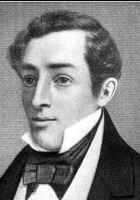Jose Maria de Heredia
Jose Maria de Heredia Poems
Evening is here. Some pigeons cross the sky.
Nothing so well an amorous fever chains
As when with pipe to lip its soothing strains
...
Although beyond the eternal snows, aspires
The vast-winged eagle still to loftier air,
That nearer to the sun in blue more clear
...
The winter has deflowered garden and heath;
Nought lives; and on the rock's unchanging gray,
Where the Atlantic's endless billows play,
...
On Egypt sleeping under sky of brass
The twain gazed wistfully from terrace high,
And watched the Flood, through Delta rolling high,
...
As when at Delphi, Thymus close behind,
He flew through stadium to applause's roar,
So on this plinth now Ladas runs one more,
...
When over us the cross its shadow throws,
Our frames enshrouded in the mould of night,
Thy body shall reflower in lily white,
...
Blue glaciers, peaks of marble, granite, slate,
Moraines whence winds from Begle to Nethou
The wheat and rye send blighting ruin through,
...
Juan Ponce de Leon, by the Devil led,
With years weighed down and crammed with antique lore,
Seeing age branch his stubby locks still more,
...
O'er their soft limbs has myrrh its fragrance shed;
And bathed in warmth beneath December's skies
...
This window has seen dames and lords of might,
Sparkling with gold, with azure, flame and nacre,
Bow down, before the altar of their Maker,
...
Pious the moss to see no more the ground;
For from this wasted wood forever gone
...
In what cold seas, under what winters' reign,
- Who can e'er know, O nacreous, fragile Shell! -
Hast thou through current, wave and tidal swell,
...
All wretched, shocking, nude, with vilest fare,
Such slave am I - my body bears the signs -
Born free at foot of gulf whose beauteous lines
...
In Bourgueil Gardens more than one of yore
Engraved loved names on bark with heavy stroke,
And many a heart 'neath Louvre's gold ceilings shook,
...
As you came out of church, all piously
Your noble hands bestowed alms freely there,
And in the darkened porch you shone so fair,
...
Jose Maria de Heredia Biography
a Cuban-born French poet. He was the fifteenth member elected for seat 4 of the Académie française during 1894. Early years Heredia was born at Fortuna Cafeyere, near Santiago de Cuba of Spanish Criollo and French ancestry. At the age of eight he went from the West Indies to France, returning then to Havana at age seventeen, and finally making France his home not long afterwards. He received his classical education with the priests of Saint Vincent at Senlis, and after his visit to Havana he studied at the Ecole des Chartes at Paris. During the later 1860s, with François Edouard Joachim Coppée, René François Armand Sully-Prudhomme, Paul Verlaine and others less distinguished, he was one of the poets who associated with Charles Leconte de Lisle, and were given the name of "Parnassiens". Career To this new school, form - the technical part of their art - was of supreme importance, and, as a reaction against the influence of Alfred de Musset, they repressed in their work the expression of personal feeling and emotion. "True poetry," said M. de Heredia in his discourse on entering the Academy - "dwells in nature and in humanity, which are eternal, and not in the heart of the creature of a day, however great." De Heredia wrote very little, and published even less, but his sonnets were circulated in manuscript form, and gave him a reputation before they were published during 1893, together with a few longer poems, as a volume, with the title Les Trophées. In the original work, he called to his great friend, Ernest Jean-Marie Millard de Bois Durand, watercolor painter, Montmartre, to illustrate his book of original watercolors. He was granted French nationality during 1893 and was elected subsequently to the Académie française on 22 February 1894, in the place of Charles de Mazade the publicist. Few purely literary men can have entered the Academy with so few credentials. A small volume of verse - a translation, with introduction, of Diaz del Castillo's History of the Conquest of New Spain (1878–1881) - a translation of the life of the nun Alferez (1894), Thomas de Quincey's "Spanish Military Nun" - and one or two short pieces of occasional verse, and an introduction or so - this is but small literary output. But the sonnets are of their kind among the most skilled of modern literature. "A Légende des siècles in sonnets" M. François Coppée termed them. During 1901 de Heredia became librarian of the Bibliothèque de l'Arsenal at Paris. He died at the Château de Bourdonné in Seine-et-Oise on the 3 October 1905, having completed his critical edition of André Chénier's works.)
The Best Poem Of Jose Maria de Heredia
The Flute
Evening is here. Some pigeons cross the sky.
Nothing so well an amorous fever chains
As when with pipe to lip its soothing strains
Blend with the rush-grown stream's fresh melody.
In shade of plane-tree where at ease we lie
The grass is soft. Let, friend, that goat which feigns
Indifference to the trembling kid she weans,
Climb up the rock and browse the herbage nigh.
With seven unequal stems of hemlock made,
Well joined with wax, my flute, or sharply played
Or grave, will weep, or moan, or joyous sing.
Come. Try Silenus' art that knows no death,
And thy sad sighs of love will take to wing
Amidst thy sacred pipe's harmonious breath.

this.................................................